I waited anxiously for the principal to respond. She did so in a devout voice, she called him professor, she was so enthralled that I was ashamed to have been born female, to be destined to be treated like that by a man even if I was well educated, even if I occupied an important position. Yet instead of screaming with rage, I felt very pleased. The principal didn’t want to let my father go, and it was clear that she kept asking him questions just to hear his tone of voice again and, who knows, maybe hoping for further compliments or the start of a friendship with a courteous and refined person who had considered her worthy of his brilliant reflections.
Even before she made up her mind to let us go, I was sure that as soon as we were in the courtyard my father would make me laugh, mimicking the tone of her voice, the way she made sure her hair was in order, the expression with which she reacted to his compliments. That is exactly what happened.
“Did you see how she batted her eyelashes? And the move with her hand, to smooth her hair? And her voice? Oh yes, uh-huh, professor, of course.”
I laughed, really like a child, my old childish admiration for that man was returning. I laughed loudly, but in embarrassment. I didn’t know whether to let go or remind myself that he didn’t deserve that admiration and scold him: you told her that men are always wrong and should assume their responsibilities, but you have never done that with Mamma, or with me. You’re a liar, Papa, a liar who frightens me just because of that good will you can draw out when you want to.
13.
His overexcitement at the success of his mission lasted until we were in the car. While he was still settling himself behind the wheel, my father rolled out pompous remarks one after another.
“Take this as a lesson. Anyone can be made to behave properly. You can be sure that for the rest of your high-school years that woman will be on your side.”
I couldn’t restrain myself and I said:
“Not on mine, on yours.”
He noticed the animosity, he seemed ashamed of his self-praise. He didn’t start the car, he ran both hands over his face, from the forehead to the chin, as if to erase what he had been until a moment earlier.
“Would you prefer to face everything by yourself?”
“Yes.”
“You didn’t like the way I behaved?”
“You were great. If you asked her to be your girlfriend, she’d say yes.”
“What should I have done, in your view?”
“Nothing, mind your own business. You left, you have another wife and other daughters, forget Mamma and me.”
“Your mother and I love each other. And you are my only, beloved daughter.”
“That’s a lie.”
My father had a flash of rage in his eyes, he seemed offended. I thought, here’s where I got the energy to hit Silvestro. But the rush of blood lasted an instant, he said gently:
“I’ll take you home.”
“Mine or yours?”
“Wherever you want.”
“I don’t want anything. Everyone always does what you want, Papa, you know how to get inside people’s heads.”
“What do you mean?”
Here again the surge of blood, I saw it in his pupils: I really could, if I wanted, make him lose his calm. But he’ll never go so far as to hit me, I thought, he doesn’t need to. He could annihilate me with words, he knows how to do it, he’s been trained since he was a boy, that’s how he destroyed Vittoria and Enzo’s love. And surely he’s trained me, too, he wanted me to be like him, until I disappointed him. But he won’t attack me even with words, he thinks he loves me and he’s afraid of hurting me. I changed my tone.
“I’m sorry,” I said, “I don’t want you to worry about me, I don’t want you to waste time doing things you don’t want to do because of me.”
“Then behave yourself. Why in the world did you hit that boy? It’s not done, it’s not right. That’s the way my sister acted and she didn’t get past fifth grade.”
“I’ve decided to make up my lost year.”
“That’s good news.”
“And I’ve decided not to see Aunt Vittoria anymore.”
“If it’s your decision, I’m glad.”
“But I’ll still see Margherita’s children.”
He looked at me in bewilderment.
“Who’s Margherita?”
For a few seconds I thought he was pretending, then I changed my mind. While his sister knew obsessively even his most secret decisions, after the break he hadn’t wanted to know anything more about her. He had fought with Vittoria for decades, but of her life he was ignorant, with a proud indifference that was an important element of his hatred. I explained to him:
“Margherita is a friend of Aunt Vittoria’s.”
He made a gesture of irritation.
“Oh, that’s right, I didn’t remember her name.”
“She has three children: Tonino, Giuliana, and Corrado. Giuliana is the best of all. I’m very fond of her, she’s five years older than me and she’s really intelligent. Her fiancé studies in Milan, he graduated there. I met him and he’s really smart.”
“What’s his name?”
“Roberto Matese.”
He looked at me uncertainly.
“Roberto Matese?”
When my father used that tone of voice there was no doubt: someone had come to mind for whom he had genuine admiration and a barely perceptible envy. In fact, his curiosity increased, he wanted to know in what circumstances I’d met him, and was immediately sure that my Roberto was the same as a young scholar who wrote very remarkable essays in an important journal published by the Catholic University. I felt my face burning with pride, with a sense of revenge. I thought: you read, you study, you write, but he’s much better than you, you also know it, right now you’re admitting it. He asked, in amazement:
“You met in Pascone?”
“Yes, at the church, he was born there, but then he moved to Milan. Aunt Vittoria introduced me to him.”
He seemed confused, as if in the space of a few sentences geography had become muddled and he had trouble keeping together Milan, the Vomero, Pascone, the house where he was born. But he quickly regained his usual understanding tone, part paternal, part professorial:
“Good, I’m glad. You have the right and the duty to deepen your acquaintance with anyone who interests you. That’s how one grows. It’s too bad you’ve nearly cut off your relationship with Angela and Ida. You all have so many things in common. You should go back to being friends the way you used to be. You know Angela also has friends in Pascone?”
It seemed that that name, in general uttered with annoyance, with bitterness, with contempt not only in my presence but probably also in Angela’s, to bring shame on his stepdaughter’s friendships, was pronounced this time in a much less resentful way. But maybe I exaggerated, I couldn’t control the impulse, which also hurt me, to cheapen it. I stared at the delicate hand that turned the key to start the car, I decided:
“O.K., I’ll come to your house for a little while.”
“No long face?”
“No.”
He cheered up, set off.
“But it’s not my house, it’s also yours.”
“I know,” I said.
As we drove toward Posillipo, I asked him, after a long silence:
“Do you talk to Angela and Ida a lot, do you have a good relationship?”
“Fairly good.”
“Better than their relationship with Mariano?”
“Maybe.”
“Do you love them more than me?”
“What are you talking about? I love you much more.”
14.
It was a lovely afternoon. Ida wanted to read me some of her poems, which I found very beautiful. She hugged me tight when I responded enthusiastically; she complained about school, which was boring and oppressive, the biggest obstacle to the free expression of her literary vocation; she promised she would let me read a long novel inspired by the three of us, if only she could find time to finish it. Angela couldn’t stop touching me, hugging me, as if she’d gotten unused to my presence and wanted to make sure I was really there. Out of the blue, she started talking about episodes of our childhood with great intimacy, sometimes laughing, sometimes with her eyes full of tears. I recalled almost nothing of what she evoked, but I didn’t tell her. I nodded yes, I laughed, and occasionally, hearing her so happy, I was seized by real nostalgia for a time that I nevertheless considered past forever and that had been imperfectly revived by her over-affectionate imagination.
Читать дальше

![Элена Ферранте - История о пропавшем ребенке [litres]](/books/32091/elena-ferrante-istoriya-o-propavshem-rebenke-litres-thumb.webp)
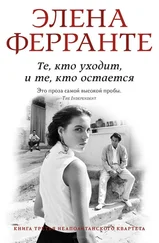
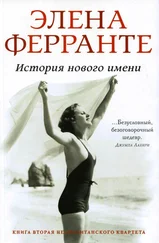
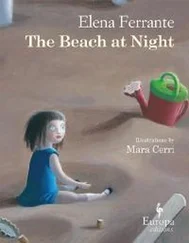
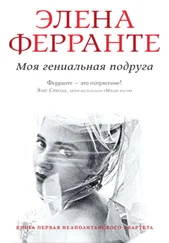
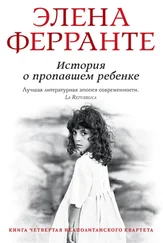
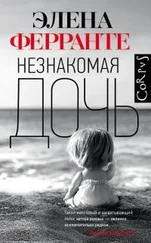
![Элена Ферранте - Дни одиночества [litres]](/books/404671/elena-ferrante-dni-odinochestva-litres-thumb.webp)



